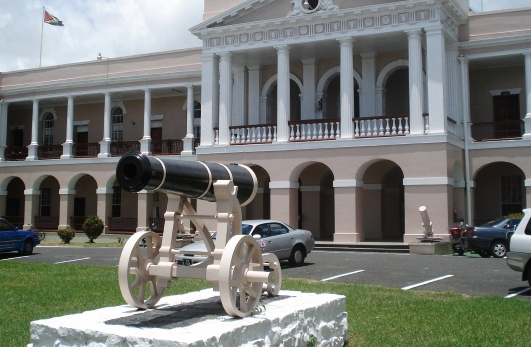The Caribbean Court of Justice (CCJ) today ruled that the motion of no confidence of December 21, 2018 was validly passed.
In its ruling today in Trinidad the CCJ affirmed the right of MPs to vote against their lists and threw out arguments related to dual citizenship and the discredited 34-majority argument.
It said that articles 106(6) and 106(7) on the motion of no-confidence had been triggered.
A release from the CCJ follows:
The Caribbean Court of Justice (CCJ) ruled on a trio of cases related to the motion of no confidence that was made in the National Assembly of Guyana on 21 December 2018. In the judgment delivered today, the CCJ declared that the motion of no confidence in the Government is valid. Guyana’s Constitution states that the Cabinet, including the President, is required to resign if the Government is defeated by the majority vote of all the elected members of the National Assembly “on a vote of confidence”. In December 2018, the Leader of the Opposition had moved “a motion of no confidence” in the Government. Mr. Charandas Persaud, a member of the Government, had joined the 32 Opposition members in voting for the motion so that 33 members voted in favour of the motion and 32 voted against.
Another provision of the Constitution required elections to be held within three months of the defeat of the Government on a motion of confidence, unless two-thirds of the National Assembly determined a longer period before the holding of elections. Despite the Speaker of the Assembly declaring that the motion had been validly passed, the Government neither resigned nor announced impending elections. This triggered a number of legal challenges in the courts in Guyana, which ultimately led to two days of hearings at the CCJ in May 2019.
There were three main issues before the Court. The first issue related to the number of votes needed to pass a vote of no-confidence. The CCJ decided that the requirement for “a majority of all the elected members of the National Assembly”, referred to a majority of the total number of votes or seats in the Assembly, irrespective of the number of members who actually vote. In determining that majority, the Court was of the opinion that the ‘half plus one’ rule was not applicable. The Court stated that the majority was clearly at least 33 votes.
The second issue was whether Mr Persaud was ineligible to vote as he was a dual citizen. Dual citizens are not allowed to put themselves up for candidacy in elections to the National Assembly. The Court found that the National Assembly (Validity of Elections) Act required that a petition alleging that Mr Persaud was disqualified from running for office would have had to be filed in the High Court of Guyana within 28 days after the publication of the results of the 2015 election. Since this case was filed in January 2019, the Court held that the challenge to Mr Persaud’s election to the Assembly had been out of time. The Court also rejected the submission that Mr Persaud was absolutely required to vote against the motion of no confidence along with other members of the Government.
Another issue hinged on the differences between a ‘motion of no confidence’ and ‘a motion of confidence’. It was argued that the provisions in the Constitution only applied to ‘motions of confidence’ which could only be raised by a member of the Government. The Court however held that the reference to ‘a vote of confidence’ in the Constitution included ‘a motion of no confidence’ which could be raised by any member of the Assembly, including the Leader of the Opposition.
The main judgment was delivered by the President of the Court, the Hon. Mr. Justice Saunders, with concurring judgments by the Hon. Messrs. Justice Wit and Anderson and the Hon. Mme. Justice Rajnauth-Lee. The bench also included the Hon. Mr. Justice Hayton. Mr Justice Wit said that while the Constitution contained provisions that prevented members from ‘crossing the floor’ and gave the representative of each both the Government and the Opposition the power to recall and replace a member. Those provisions could not, and were not, meant to prevent members from so voting.
Mr. Justice Anderson said that there may be need for drafters to revisit the language of ‘confidence motions’ provisions in the Constitution to bring about more clarity. He also said that while challenges to disqualifications for elections were generally barred after 28 days after the election, in his opinion, there may be cases such as fraud where the Court would have jurisdiction to hear the matter. Mme. Justice Rajnauth-Lee in her judgment stated that “there was nothing which prevented Mr Persaud from voting in favour of the no confidence motion” and she urged all to bear in mind that the rule of law was an important guiding constitutional principle of a sovereign democratic state like Guyana.
In the coming days, the Court will hear further arguments from the parties on the consequences that should flow from the validity of the motion of no confidence. The full judgment of the Court, along with a judgment summary, is available on the Court’s website at www.ccj.org.










